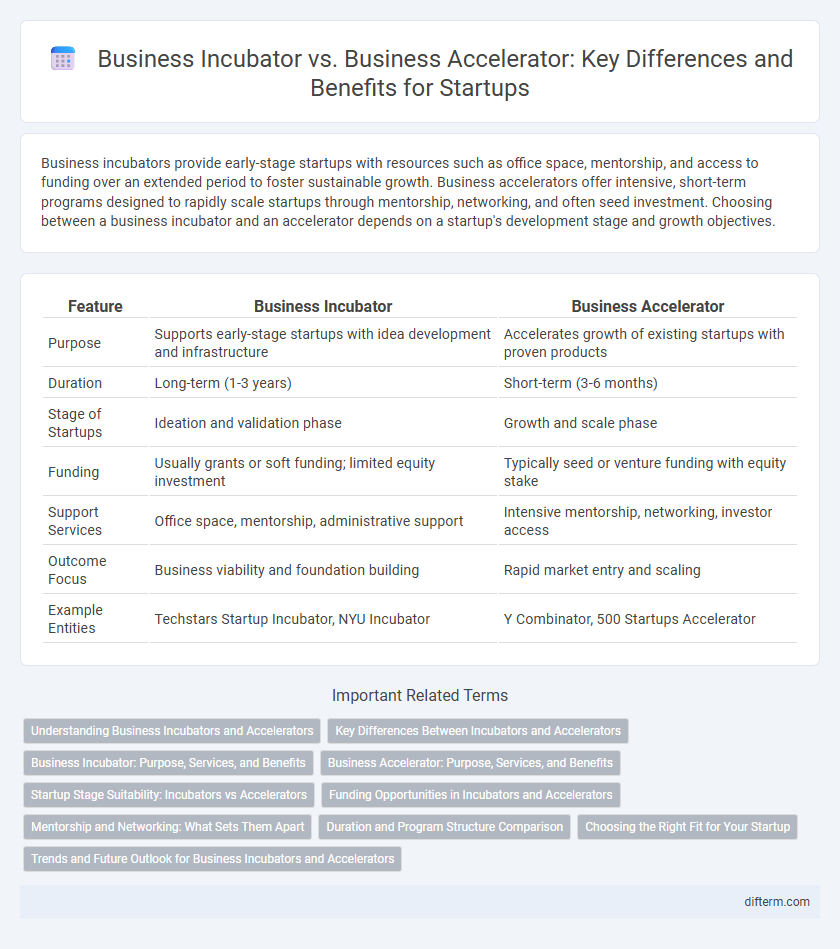Business incubators provide early-stage startups with resources such as office space, mentorship, and access to funding over an extended period to foster sustainable growth. Business accelerators offer intensive, short-term programs designed to rapidly scale startups through mentorship, networking, and often seed investment. Choosing between a business incubator and an accelerator depends on a startup's development stage and growth objectives.
Table of Comparison
| Feature | Business Incubator | Business Accelerator |
|---|---|---|
| Purpose | Supports early-stage startups with idea development and infrastructure | Accelerates growth of existing startups with proven products |
| Duration | Long-term (1-3 years) | Short-term (3-6 months) |
| Stage of Startups | Ideation and validation phase | Growth and scale phase |
| Funding | Usually grants or soft funding; limited equity investment | Typically seed or venture funding with equity stake |
| Support Services | Office space, mentorship, administrative support | Intensive mentorship, networking, investor access |
| Outcome Focus | Business viability and foundation building | Rapid market entry and scaling |
| Example Entities | Techstars Startup Incubator, NYU Incubator | Y Combinator, 500 Startups Accelerator |
Understanding Business Incubators and Accelerators
Business incubators provide startups with essential resources such as office space, mentoring, and seed funding, typically supporting early-stage companies over extended periods to foster growth and stability. Business accelerators, by contrast, offer time-limited, intense programs that focus on rapid business scaling, often culminating in pitch events to attract investors. Understanding these distinctions helps entrepreneurs select the appropriate support model based on their company's development stage and growth objectives.
Key Differences Between Incubators and Accelerators
Business incubators provide early-stage startups with office space, mentorship, and resources over an extended period, focusing on nurturing ideas into viable businesses. Accelerators target more mature startups, offering intensive, time-limited programs designed to scale growth rapidly through mentorship, networking, and investment opportunities. The key differences lie in program duration, stage of business support, and the level of investment involvement.
Business Incubator: Purpose, Services, and Benefits
Business incubators primarily focus on nurturing early-stage startups by providing essential services such as office space, mentorship, and access to funding networks to foster sustainable business growth. Their purpose is to reduce the risks associated with launching new ventures through tailored support in product development, market research, and business planning over an extended period. The benefits include increased survival rates, stronger business foundations, and enhanced opportunities for innovation within a collaborative environment.
Business Accelerator: Purpose, Services, and Benefits
Business accelerators focus on rapidly scaling startups by providing mentorship, seed funding, and intensive training programs over fixed timeframes, typically 3 to 6 months. Their services include networking opportunities with investors, market exposure, and access to expert guidance designed to fast-track product development and customer acquisition. The benefits of business accelerators lie in accelerated growth, increased funding chances, and enhanced market readiness for startups poised to expand quickly.
Startup Stage Suitability: Incubators vs Accelerators
Business incubators primarily support early-stage startups by providing resources such as office space, mentorship, and business services to help founders develop their ideas and build a solid foundation. Business accelerators focus on growth-stage startups that have a viable product and market fit, offering intense, time-limited programs designed to scale operations rapidly through mentorship, funding, and networking. Startups in the ideation or proof-of-concept phase benefit most from incubators, while those seeking rapid expansion and investment readiness align better with accelerators.
Funding Opportunities in Incubators and Accelerators
Business incubators typically offer early-stage startups access to seed funding, grants, and in-kind resources tailored to nurture fledgling companies over a longer period. Business accelerators provide more intensive, short-term programs with opportunities for equity investment from venture capitalists and angel investors, aiming to rapidly scale growth and prepare companies for subsequent funding rounds. Both models enhance funding prospects but differ in investment structure, duration, and the stage of business development they target.
Mentorship and Networking: What Sets Them Apart
Business incubators offer long-term mentorship focusing on foundational skills for early-stage startups, while business accelerators provide intense, short-term mentorship tailored to scaling and market readiness. Networking opportunities in incubators emphasize building local community connections and resources, whereas accelerators connect startups to a broad network of investors, industry experts, and potential partners for rapid growth. The distinct mentorship styles and networking scopes align directly with the differing goals of incubation and acceleration programs.
Duration and Program Structure Comparison
Business incubators typically offer long-term support lasting from several months to years, providing startups with a flexible program structure that includes office space, mentoring, and access to resources. In contrast, business accelerators deliver intensive, short-term programs usually spanning three to six months, focusing on rapid growth through structured mentorship, networking, and often culminating in a demo day. The extended duration of incubators supports early-stage development phases, while accelerators target startups ready to scale quickly within a condensed timeline.
Choosing the Right Fit for Your Startup
Business incubators provide long-term support and resources for startups in their earliest stages, offering mentorship, office space, and access to funding over several months to years. Business accelerators deliver intensive, short-term programs designed to rapidly scale startups, emphasizing growth, networking, and investor connections within a few months. Selecting the right fit depends on your startup's development stage, goals, and need for speed versus comprehensive foundational support.
Trends and Future Outlook for Business Incubators and Accelerators
Business incubators and accelerators continue to evolve with a strong focus on tech-driven startups, emphasizing artificial intelligence, renewable energy, and digital health sectors. The future outlook for both models highlights increased integration of virtual and hybrid programs to expand global reach and accessibility. Data trends indicate a growing emphasis on sustainability and diversity, driving tailored support services and investment in underrepresented entrepreneurs.
Business Incubator vs Business Accelerator Infographic

 difterm.com
difterm.com